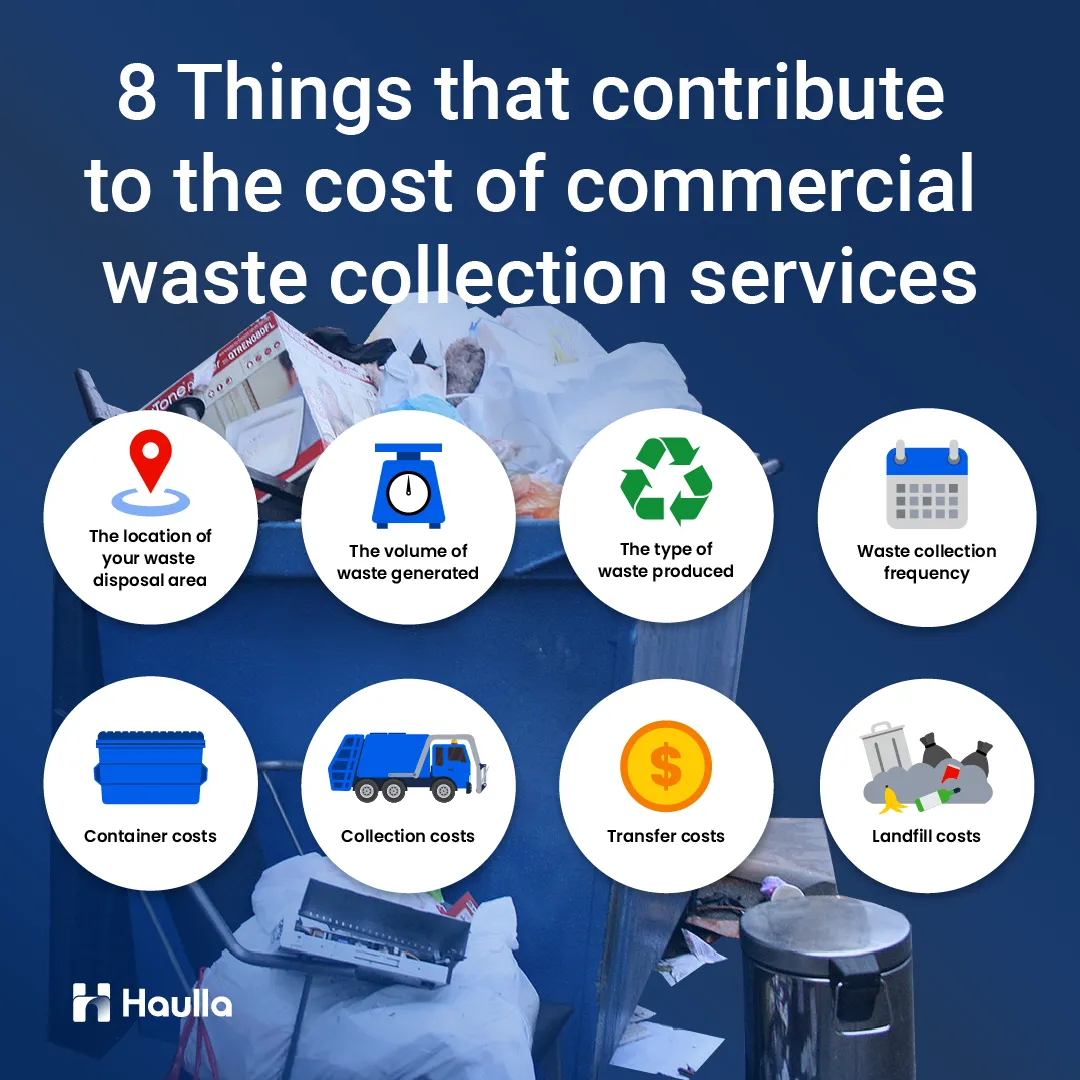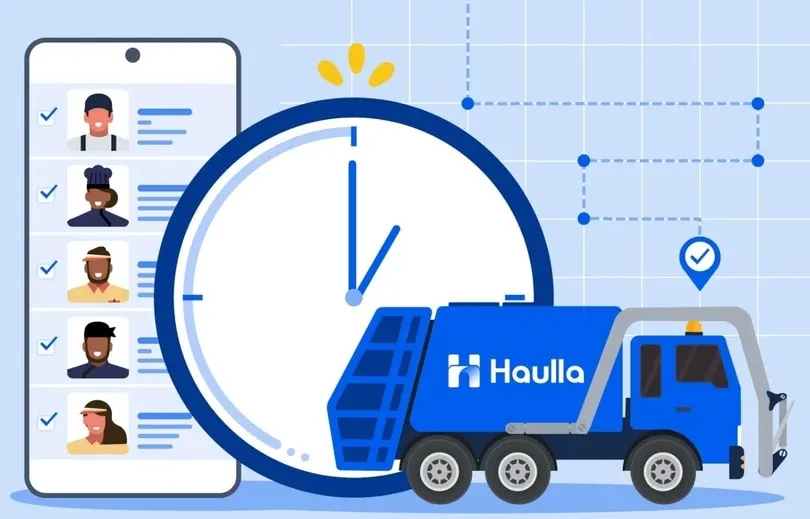How Much Does Commercial Waste Collection Cost?
September 1, 2022
Commercial waste management is a vital but often overlooked service. Businesses generate a lot of waste, and if that waste isn't properly disposed of, it can create serious environmental and health hazards.
Fortunately, some companies specialize in commercial waste disposal. These companies can collect and dispose of waste quickly and efficiently, helping to keep your business safe and clean.
However, commercial waste disposal services can be expensive. The cost will vary depending on the size and scope of your business, but it's important to budget for these services.
In this article, we will discuss the need for waste collection management and the factors that determine its disposal costs.Further, we'll shed some light on how professional waste management companies help manage your waste costs and reduce waste disposal fees.
What is commercial waste?
Commercial waste is any waste material that is generated as a result of commercial or business activities. This can include anything from office paper and packaging to food waste, scraps, yard waste, and construction debris.
Commercial waste is typically managed by businesses, though local governments may also be involved in its collection and disposal. Businesses are responsible for disposing of their own commercial waste, though they may contract with a waste management company to handle this for them.
Waste collection services collect commercial waste from businesses and then transport it to a landfill or incinerator for disposal. In some cases, commercial waste may be sorted and recycled at the transfer stations before it is disposed of.
Who needs commercial waste collection services?
Commercial waste disposal collection services are an important part of keeping any business running smoothly. Whether you own a restaurant, retail store, office building, or any other type of commercial property, chances are you produce a lot of waste.
While some businesses choose to save money and handle their own waste disposal, this is usually not the best solution. Not only is it time-consuming and costly, but it can also be dangerous to handle glass or any other hazardous material.
Waste management professionals have the tools and experience necessary to safely and efficiently collect and dispose of commercial waste. As a result, commercial waste collection services are an essential part of keeping your business clean and compliant with environmental regulations, in addition to cutting transportation costs to reduce waste efficiently.
Here are a few sectors that can benefit from a commercial garbage collection and recycling service.
- Retail Offices
There are many different types of commercial waste produced by retail offices. The most common type is paper waste.
In addition to paper waste, retail offices also produce a significant amount of packaging waste and food waste, such as cardboard boxes and plastic wrap. They produce a small amount of electronic waste, such as worn-out computers and printers.
- Restaurants
Restaurants produce a variety of waste, including food scraps, paper items, and cooking oil. Food scraps make up the majority of restaurant waste. This wasted food takes up valuable space in landfills and emits methane gas as it decomposes.
Paper products, such as napkins, paper towels, and to-go boxes, are also common restaurant waste.
- Construction Sites
Construction sites can produce a lot of commercial waste. This includes everything from wood and metal scraps to concrete and bricks. And it's not the type of waste you can dump along with regular trash.
In order to dispose of this waste properly, it is important to have a proper dumpster on site. Otherwise, the waste will end up in landfills where it will take up valuable space. Using a roll-off container is one of the simple ways to collect all the construction and demolition waste.
- Manufacturing & Industrial
The amount and type of commercial waste produced by manufacturing and industrial sectors vary depending on the particular industry. In general, however, these industries generate large amounts of solid waste that is typically high in combustible materials.
This means that it can be difficult and expensive to dispose of this type of waste properly. In addition, many manufacturing and industrial processes generate hazardous wastes that can be harmful to both humans and the environment.
How much does commercial waste collection cost?
Commercial waste collection can be a bit of a mystery for business owners. How much does it cost? What services are included? And how can you be sure you're getting the best value for your money?
Let's discuss in detail the factors that contribute to the cost of commercial waste collection services and the average cost that businesses spend on each factor.

1. The location of your waste disposal area
The location of the waste disposal area is a major factor that contributes to the cost of commercial waste collection. The closer the waste disposal area is to the business, the less it will cost to collect and dispose of the waste. However, if the business is located in a remote area, the collection and disposal costs can be significantly higher.
2. The volume of waste generated
A key factor in determining the cost of commercial waste collection is the volume of waste generated. The more waste a business produces, the more it will cost to have that waste collected. This is because businesses are usually charged based on the size or weight of their waste.
3. The type of waste produced
The majority of commercial waste is food waste, followed by paper and cardboard. Other types of commercial waste include glass, plastic, metal, and hazardous waste.
Hazardous wastes are any materials that are flammable, corrosive, toxic, or reactive. They are the most regulated and thus, the most costly to dispose of, and normally handled by special hazardous waste collectors.
As a result, commercial waste collectors must account for all these factors when determining their rates.
4. Waste collection frequency
The cost of commercial waste collection can be affected by a number of factors, including the frequency of collection. Generally speaking, the more often waste is collected, the higher the cost will be.
This is because more collection trips are required, and additional labor may be needed to handle the increased volume of waste. However, there are other important factors to consider as well.
For example, if a business generates a large amount of waste, it may need to be collected more frequently in order to avoid overflowing dumpsters. In addition, businesses located in crowded areas or with limited storage space may also need to have their waste collected more often.
5. Container costs
You need to choose the right container size depending on the type of waste you'll be generating, the collection frequency, and the distance to the nearest landfill. Also, consider whether you want to purchase or simply rent a commercial dumpster based on your needs.
For front loading boxes for small to medium-sized organizations, the average costs range from $350 to $600.And for large businesses and industrial sectors, the average costs are reasonably high, starting from $2,000 and above.
6. Collection costs
Waste collection costs are dependent on your collection frequency, your location, and the container size. Here is a general guideline giving the average collection cost based on container size and the waste pickup frequency.
- For waste that ranges from 20 gallons to 65 gallons with a once-a-week pickup frequency, the price ranges from $30 to $60.
- 90 gallons and above with a five-day-a-week pickup frequency are charged anywhere between $72 to $500.
- Container sizes in the range of 1 cubic yard to 5 cubic yards with a five-day-a-week pickup frequency cost anywhere between $290 to $2,600.
- For large containers measuring above 5 cubic yards and a five-day-a-week pickup frequency, the costs start from $590 and go up to $3,500 depending on the various factors involved.
7. Transfer costs
In the United States, commercial businesses generated about 7.6 pounds of waste per person per day in 2012. This totals to about 251 million tons of commercial waste annually (EPA).
The estimated cost to transfer and dispose of this commercial waste was $52.5 billion in 2017. The average cost per ton to transfer and dispose of commercial waste was $206 in 2017.
These costs can range from $70 to $400 per ton, depending on the type and amount of waste, the specific location, and other factors such as tipping fees (Waste Management). On average, it costs about $50 per month to have a single cubic yard of waste removed from business premises.
8. Landfill costs
The average commercial waste landfill costs about $80 per ton. This includes the cost of MSW (municipal solid waste) disposal, which is the main type of waste that goes into landfills. The MSW disposal cost varies depending on the type of MSW (e.g., paper, plastic, glass, etc.), but the average is about $45 per ton.
Other landfill costs include those for operations, maintenance, and closure, which range from $5 to $30 per ton. Finally, there are state and local taxes, which can add another $5 to $10 per ton. In total, the average commercial landfill costs about $80 per ton.
How can Haulla help in reducing commercial waste collection costs?

If reliable waste pickup, zero hidden fees, great customer service, and cheap commercial waste disposal services are what you're seeking, Haulla is all you need to help you save money and get all the clutter cleared away without a trace!
From free estimates, consultations, and termination services to a 100% best price guarantee, Haulla is your professional garbage collection solution. Find us here and reach out to us today!
